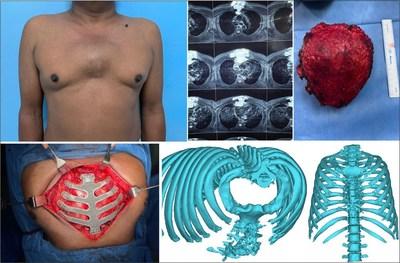Doctors in Dubai have successfully completed a series of surgeries on a young male patient to improve his facial deformities using 3D printed titanium implants. The surgery, which the medical team described as a unique case in the world, completely reconstructed the patient's facial bones, which had been severely damaged by several benign tumours.
Doctors in Dubai have successfully completed a series of surgeries on a young male patient to improve his facial deformities using 3D printed titanium implants. The surgery, which the medical team described as a unique case in the world, completely reconstructed the patient's facial bones, which had been severely damaged by several benign tumours.
The procedure was led by Professor Jehad Al Sukhun, a specialist in maxillofacial surgery at Emirates Hospital, who told Today: "For the first time, we used 3D printing technology to design a 3D titanium facial implant to reconstruct a defect in the facial skeleton. "The patient healed well and had amazing aesthetic results. We are now living in a new era."
3D printed titanium implants
Additive manufacturing has been used for some time to create anatomical models to help surgeons for complex surgical and training purposes, as well as to produce bespoke surgical guides to improve surgical outcomes. Now, the technology is being used to create biocompatible, patient-specific implants capable of promoting bone cell growth and repairing structural deformities. In fact, a recent study conducted by a team of Korean researchers validated the effectiveness and safety of patient-specific 3D printed titanium implants in the maxillofacial skeleton. Of the 28 implants fitted, only one failed to integrate successfully with the bone, while the others performed 'satisfactorily' in treating a variety of oral and maxillofacial defects.
Meanwhile, in December, Health Canada approved its first Canadian-made 3D-printed medical implant, a customisable titanium mandibular plate for facial reconstruction surgery, while in February, India's Manipal Hospital used a 3D-printed titanium implant to reconstruct a patient's entire sternum and rib cage, meaning he will no longer be dependent on medical ventilation for the rest of his life.

Reconstruction of the entire sternum and rib cage using a 3D printed custom titanium implant. Image from Manipal Hospital.
Repairing facial deformities
The surgical team at Emirates Hospital faced a major challenge in treating a patient with a facial deformity. The 20-year-old had multiple benign tumours that had damaged his facial bones and prevented him from breathing, speaking and eating properly. The team embarked on a series of investigations involving CT and MRI scans and histopathological biopsies to assess the best way to treat the patient. After gathering all the information they needed, the team performed a series of surgeries to extract the tumour and reconstruct the patient's facial bones.
In what the team claims is a unique case worldwide, surgeons 3D printed a number of bespoke titanium implants to reconstruct the patient's facial bones after removal of the tumour. The choice of implants meant that the patient did not have to undergo multiple soft and hard microvascular grafts from the abdomen and legs to reconstruct his facial bones, which would have had a serious impact on his quality of life. The team has chosen this approach in several successful reconstructive procedures involving 3D printed implants that have been reported recently. According to Sukhun, the patient healed well and had "amazing" aesthetic results that could not be achieved with alternative methods such as skin and bone grafts.

